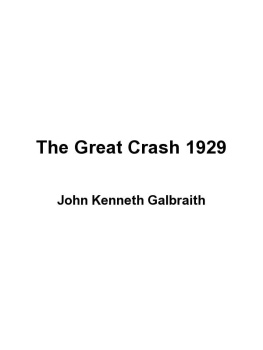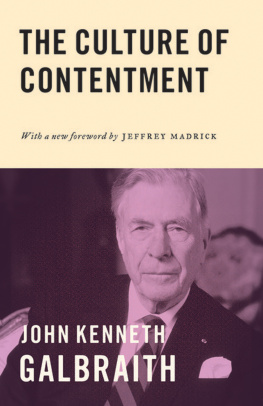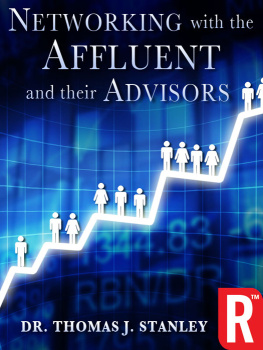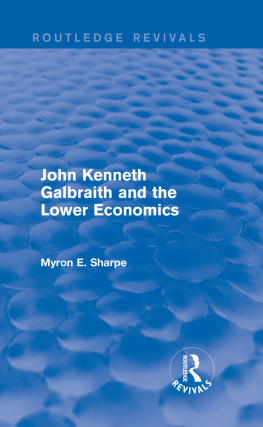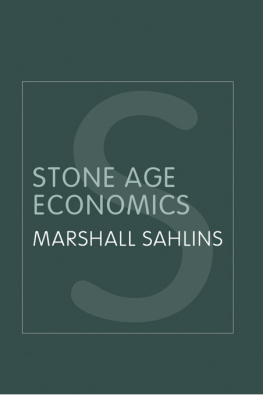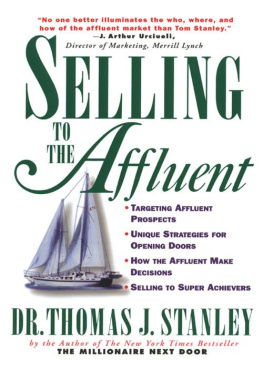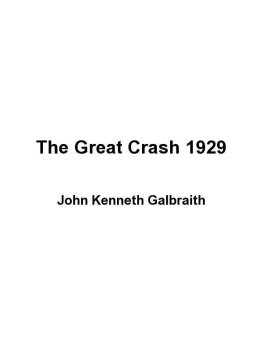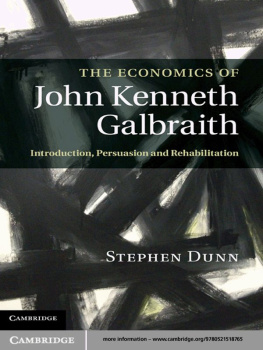Fortieth Anniversary Edition
A Mariner Book
HOUGHTON MIFFLIN COMPANY
BOSTON NEW YORK
Copyright 1958, 1969, 1976, 1998
by John Kenneth Galbraith
All rights reserved
For information about permission to reproduce
selections from this book, write to
Permissions, Houghton Mifflin Company,
215 Park Avenue South, New York,
New York 10003.
Library of Congress Cataloging-in-Publication Data
Galbraith, John Kenneth, date
The affluent society / John Kenneth Galbraith
p. cm.
Includes bibliographical references and index.
ISBN 0-395-63751-1
ISBN 0-395-92500-2 (pbk.)
1. United StatesEconomic conditions1945
2. United StatesEconomic policy.
3. EconomicsUnited States. I. Title
HC106.5G32 1998 330.973 dc20 94-4816
CIP
Printed in the United States of America
Book design by Robert Overholtzer
QUM 10 9 8 7 6 5 4 3 2 1
To Alan, Peter and Jamie
The economist, like everyone else, must concern himself with the ultimate aims of man.
ALFRED MARSHALL
Contents
Introduction to the Fortieth Anniversary Edition
1. The Affluent Society
2. The Concept of the Conventional Wisdom
3. Economics and the Tradition of Despair
4. The Uncertain Reassurance
5. The American Mood
6. The Marxian Pall
7. Inequality
8. Economic Security
9. The Paramount Position of Production
10. The Imperatives of Consumer Demand
11. The Dependence Effect
12. The Vested Interest in Output
13. The Bill Collector Cometh
14. Inflation
15. The Monetary Illusion
16. Production and Price Stability
17. The Theory of Social Balance
18. The Investment Balance
19. The Transition
20. The Divorce of Production from Security
21. The Redress of Balance
22. The Position of Poverty
23. Labor, Leisure and the New Class
24. On Security and Survival
Afterword
Index
INTRODUCTION TO THE FORTIETH ANNIVERSARY EDITION
PUBLISHING A NEW EDITION of a book after forty years one faces a serious question: How much should one change to reflect later thought? How much should remain to tell of the earlier mood and beliefs? I have opted, not exceptionally, for compromise.
Much of the original text still has my approval. Nothing, for example, gives me more pleasure than the chapter on the concept of the conventional wisdom. That phrase has now passed into the language; I encounter it daily, used by individuals, some disapproving of my general stance on economics and politics, who have no thought as to its source. Perhaps I should have taken out a patent.
More seriously, I still adhere to one of the book's main conclusions that, sadly, economic writing and teaching instill attitudes and beliefs that resist accommodation to a changing world. In consequence, the early chapters stressing the importance of the history of economic thought and its continuing effect are as I would now write them. A grim view of the human prospect emerged from the writing of David Ricardo, Thomas Robert Malthus and, until his inevitable revolution, of Karl Marx. That matters have improved in the more fortunate countries of the world is not in doubt. A certain inherent pessimism remains. It is with a durably improved condition that The Affluent Society is primarily concerned.
Central to the improvement has been a greater security in economic life and in its pecuniary return. This has been enhanced by the corporate managerial structure, the growth of the professions, employment in the arts and entertainment, social security, medical insurance, and much else. I would now, however, more strongly emphasize, and especially as to the United States, the inequality in income and that it is getting worsethat the poor remain poor and the command of income by those in the top income brackets is increasing egregiously. So is the political eloquence and power by which that income is defended. This I did not foresee.
As the major theme of the book, I urged that the production of goods and services is the measure of civilized success. This I would still stress. The Gross Domestic Product remains the accepted measure not only of economic but of larger social achievement. It also wonderfully rewards the fortunate, especially the business executive, who, in the common case, effectively sets his own pay. (When someone seeks to sound a humane note, he stresses that the real social reward of production is not the increased income but the jobs provided. This establishes the speaker as a man of compassion.)
In the real world, as I tell, the productive process incorporates the means by which wants are created, and these are further sustained by fashion, social aspiration and simple imitation. What others do or have, one should do or have. The most important and intrinsically most evident source of consumer demand is the advertising and salesmanship of those providing the product. First you make the good, then you make the market. This is deeply in conflict with accepted economic thought. In that, nothing was so fundamental as the concept of consumer sovereigntythe according of final economic authority to those the economic system serves.
In the years after this book appeared, those who spoke for the established view, for consumer sovereignly, were not pleased. They were adamant, even angry, in opposition. The textbooks, as they were revised, took note of my heresy, rejected it and told that Ford had once tried to market a new and radically designed car called the Edsel. This the consumers, being sovereign, would not buy. Here was the true sovereignty.
In time the opposition mellowed; that the consumer is, in fact, less than sovereign is, I judge, now accepted. Producer advertising and salesmanship are recognized forces. The Edsel seems to have disappeared from the textbooks.
On two matters this book was right, and before its time. On one, time and economic changes have shown it to be wrong. I begin with the error.
Running through the early editions of The Affluent Society was a strongly expressed warning about inflation. It was the prime threat hovering over a society of general well-being. Inflation or unemployment. This is no longer so clearly the case. The principal cause of inflation then was the interaction of wages and prices. Management and unions negotiated; wages were increased, in part because of past price increases; prices were then raised further in compensation. From the higher prices came new wage demands. The process continuedthe wage-price spiral. Monetary and fiscal policy were effective in controlling it only so far as they curtailed investor and consumer expenditure, thus reducing production, increasing unemployment and so limiting the wage demands and the resulting price increases. It was a remedy decidedly worse than the disease.
This dismal sequence is now less of a threat. Production has shifted away from traditional industry where unions once were strong. The services, the professions and the arts, the entertainment and communications industries have become increasingly important areas of employment. So also the higher technology. Here the unions are less important or unimportant. And in the older industry, they are less aggressive, perhaps less forcefully led. Accordingly, the wage-price spiral is no longer a strongly motivating economic force, and so there is less inflation even when employment is high. For some time, as this is written, we have had low unemployment and little inflation, a circumstance much celebrated. This I did not foresee. I have quietly deleted some paragraphs that no longer apply.
The two matters on which I can reasonably claim foresight are the distribution and maldistribution of money and effort between the public and the private living standards and the important question of the environment.
Next page




